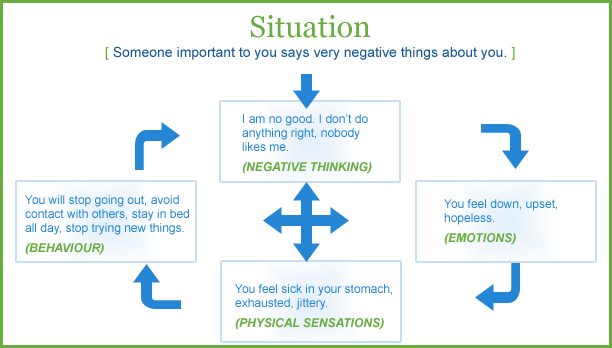CBT
CBT
WHAT IS INVOLVED IN CBT THERAPY?

CBT is based on the concept that your thoughts, feelings, physical sensations and actions are connected, and that negative thoughts and feelings can trap you in a vicious cycle.
CBT aims to help you deal with overwhelming problems in a more positive way by breaking them down into smaller parts.
You’re shown how to change these negative patterns to improve the way you feel.
WHAT HAPPENS DURING CBT SESSIONS?
The course of treatment usually lasts for between 12 to 20 sessions, with each session lasting around 60 minutes. Sessions are generally weekly. They can be face to face, SKYPE or over the phone.
During the sessions, you’ll work with your therapist to break down your problems into their separate parts, such as your thoughts, physical feelings and actions. Clients are actively encouraged to do out of sessions work to help increase their learning from in-session work and it is termed ‘home work tasks’.

There is evidence to suggestion homework tasks help progress therapy and lead to better outcome of the client’s recovery.
Your therapist will then be able to help you work out how to change unhelpful thoughts and behaviours.
After working out what you can change, your therapist will ask you to practise these changes in your daily life and you’ll discuss how you got on during the next session.
The aim of therapy is to teach you to apply the skills you have learnt during treatment to your daily life and practice the skills independently, therefore ‘become your own therapist’.
The aim is to help you manage your problems and stop them having a negative impact on your life, thus ‘improving your quality of life, even after you have completed treatment.
WHAT ARE THERE RISKS IN PSYCHOTHERAPY?
All effective tackling therapies carry some risk. During psychotherapy we may discuss some painful emotions and memories , which may temporarily lead to feeling worse. This is part of the process of understanding , learning and managing one’s feelings.
The process of psychotherapy can make people question the way they live their lives and make relationships. It is important that people try not to make major life decisions whilst they are in such upheaval, because the decisions may be impulsive, before the underlying issues have been understood. Sometimes, however, important decisions have to be made, and therapy should then provide a place for reflection and considering the options. You can discuss any feelings likes these with your therapist.
Sometimes a person drops out of therapy, feeling disappointed or angry with their therapist. As with any relationship, the reasons for this may be simple or complex – and there may be great benefit, even if the relationship ends, from understanding what went wrong, and why. Any difficulties experienced should be brought up in therapy to be understood and worked out in collaboration with the client and therapist. There is evidence in psychotherapy that suggests resolving issues in therapy when things are difficult can actually help strengthen the therapeutic relationship.
If a therapy does break down, sometimes the person will later come back to treatment with someone else, to tackle problems that were not able to be dealt with the first time.
The psychotherapist is highly skilled enough to deal with difficulties in relationships and with skill full assessment , discussion and negotiation, the client and therapist are likely to manage the difficulties together and successfully resolve issues.









Previous
Next
